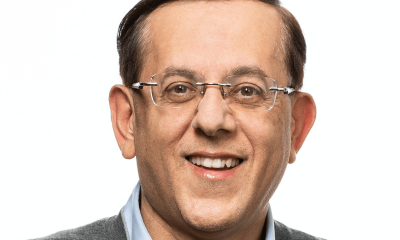Business
HBO Max delivers a beautiful and optimistic pandemic story.

Station Eleven opens with the foreboding image of an abandoned theater overrun by wildlife. The sudden flicker of a spotlight transports us back to the theater’s final performance of King Lear, starring famed actor Arthur Leander in the lead. The transition is seamless but eerie. It’s the first of many indications that calamity is on its way.
Other signs may seem more familiar. A text from someone saying they aren’t feeling well. A sinister chorus of coughs. A call from a hospital warning of a dangerous flu. As Station Eleven‘s first episode unfolds, it becomes clear that the calamity hinted at in the show’s opening moments is a plague of epic proportions.
With anxiety about the Omicron variant of COVID-19 hanging over our heads, I wouldn’t blame you for not wanting to see a show about a pandemic. But trust me when I say that HBO Max’s Station Eleven is a surprisingly uplifting apocalypse story that’s more than worth the watch.
Based on Emily St. John Mandel’s novel of the same name, Station Eleven spends most of its time interrogating the tension between present and past. It flits between timelines, replaying the occasional scene from a different perspective or leaving crucial pieces of backstory unknown until a few episodes in. Instead of being frustrating, the non-linear narrative proves to be a moving storytelling device, allowing Station Eleven to carefully piece together the lives of its many characters.
“Station Eleven” is a surprisingly uplifting apocalypse story that’s more than worth the watch.
Among them are Jeevan Chaudhary (Himesh Patel) and child actor Kirsten Raymonde, whose past self is played by Matilda Lawler and whose present-day self is played by Mackenzie Davis. In the King Lear audience when Arthur Leander (Gael García Bernal) suffers a heart attack, Jeevan jumps onstage to help. In the chaos that follows, Kirsten’s parents are nowhere to be seen. Jeevan offers to help her get home. But when he gets wind of the flu, the two have to take shelter.
Fast forward 20 years: Kirsten is now part of the Traveling Symphony, a group of actors and musicians who perform Shakespeare at settlements around Lake Michigan. There’s no sign of Jeevan. When the Symphony crosses paths with the mysterious man known as the Prophet, their way of life comes under fire.
Other plots involve the creation of the Museum of Civilization at a Michigan airport and the relationship between Arthur and his wife Miranda Carroll (The Harder They Fall‘s Danielle Deadwyler). Miranda is working on a comic book called Station Eleven, which finds its way into other characters’ lives in surprising ways.

Ride along with the Traveling Symphony.
Credit: Ian Watson/HBO Max
Between Miranda’s comic and the Traveling Symphony’s performances, Station Eleven makes a strong case that art — and the connection it brings us — will last beyond the end of the world. The glimpses we get of the Traveling Symphony’s Hamlet are some of the show’s strangest and most intriguing, with a post-apocalyptic set and costume designs that are both strange and beautiful. In another stand-out scene, Traveling Symphony hopeful Dan (Dylan Taylor) performs a monologue from Independence Day. As he mimes a microphone, clever sound design warps his voice until we believe he’s actually holding one. The Independence Day theme swells in the background as onlookers become more entranced, turning an audition into a transformative theatrical experience.
Beyond making a statement about capital-A Art, Station Eleven interests itself in how people adapt in times of crisis. The show’s outlook on the apocalypse is refreshingly optimistic. Yes, there are dangerous people lurking in the shadows. But there are also groups of good people who will gladly take in strangers, provide entertainment, or protect others. A whole new generation — known as “post-pans” — manages to grow up in this world. Station Eleven by no means presents the end of the world as a utopia, but it’s a more forgiving and human portrayal of the end times than you’d expect considering the usually bleak approaches to plague in apocalyptic media.
Station Eleven‘s humanity is bolstered by its cast, all of whom deliver remarkable performances. Davis is the perfect mix of steely and vulnerable as Kirsten, whose childhood was spent surviving the pandemic. Lawler is tasked with playing out the most traumatic parts of that childhood, and she carries it off with a maturity beyond her years. The dawning horror of the pandemic is shown through Jeevan’s eyes, which Patel conveys with a balance of worry for himself and concern for Kirsten. He and Lawler set a high bar in the first episode, and the rest of Station Eleven‘s cast rises to meet it at every turn.
While not every character interacts with each other, Station Eleven weaves a web between its ensemble that will leave you breathless. Pieces fall into place in the strangest ways with connections taking place decades after being set up. It’s a beautiful puzzle that you solve along the way, and by the time you finish the final episode, you’ll feel a way you’d never expect after watching characters navigate the apocalypse: hopeful.
Station Eleven is now streaming on HBO Max, with new episodes every week.
-

 Entertainment6 days ago
Entertainment6 days agoSummer Movie Preview: From ‘Alien’ and ‘Furiosa’ to ‘Deadpool and Wolverine’
-

 Entertainment5 days ago
Entertainment5 days agoWhat’s on the far side of the moon? Not darkness.
-

 Business6 days ago
Business6 days agoThoma Bravo to take UK cybersecurity company Darktrace private in $5B deal
-

 Business6 days ago
Business6 days agoHow Rubrik’s IPO paid off big for Greylock VC Asheem Chandna
-

 Business5 days ago
Business5 days agoTikTok faces a ban in the US, Tesla profits drop and healthcare data leaks
-

 Business4 days ago
Business4 days agoLondon’s first defense tech hackathon brings Ukraine war closer to the city’s startups
-

 Business7 days ago
Business7 days agoZomato’s quick commerce unit Blinkit eclipses core food business in value, says Goldman Sachs
-

 Entertainment7 days ago
Entertainment7 days agoMonsta X’s I.M on making music, gaming, and being called ‘zaddy’






















